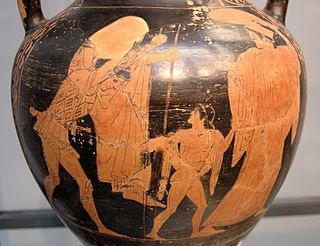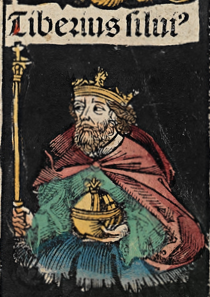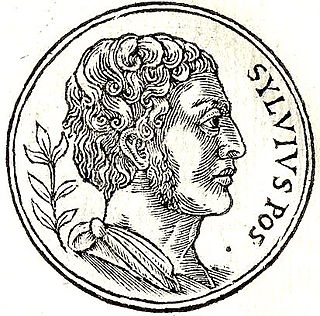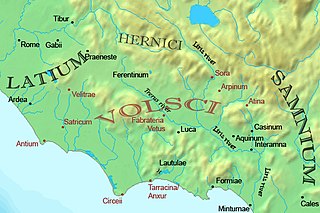
The founding of Rome was a prehistoric event or process later greatly embellished by Roman historians and poets. Archaeological evidence indicates that Rome developed from the gradual union of several hilltop villages during the Final Bronze Age or early Iron Age. Prehistoric habitation of the Italian Peninsula occurred by 48,000 years ago, with the area of Rome being settled by around 1600 BC. Some evidence on the Capitoline Hill possibly dates as early as c. 1700 BC and the nearby valley that later housed the Roman Forum had a developed necropolis by at least 1000 BC. The combination of the hilltop settlements into a single polity by the later 8th century BC was probably influenced by the trend for city-state formation emerging from ancient Greece.
Alba is the Scottish Gaelic name for Scotland.

Latinus was a figure both in Greek and Roman mythology. He is often associated with the heroes of the Trojan War, namely Odysseus and Aeneas. Although his appearance in the Aeneid is irreconcilable with his appearance in Greek mythology, the two pictures are not so different that he cannot be seen as one character.

Ascanius was a legendary king of Alba Longa and is the son of the Trojan hero Aeneas and Creusa, daughter of Priam. He is a character in Roman mythology, and has a divine lineage, being the son of Aeneas, who is the son of the goddess Venus and the hero Anchises, a relative of the king Priam; thus Ascanius has divine ascendents by both parents, being descendants of god Jupiter and Dardanus. He is also an ancestor of Romulus, Remus and the Gens Julia. Together with his father, he is a major character in Virgil's Aeneid, and he is depicted as one of the founders of the Roman race.
In Roman and Greek mythology, Capys was a name attributed to three individuals:

Tiberinus was the ninth king of Alba Longa, according to the traditional history of Rome handed down by Titus Livius. He was the successor of Capetus, the eighth king of Alba Longa. The Alban kings claimed descent from Aeneas, a Trojan prince who brought a remnant of the Trojan populace to Italy following the sack of Troy, and settled in Latium. Alba was built by Ascanius, the son of Aeneas and Lavinia, and founder of the Alban royal line. The Alban kings, including Tiberinus, bore the cognomenSilvius, after the son of Ascanius, who was said to have been born in the woods.
Procas or Proca was one of the Latin kings of Alba Longa in the mythic tradition of the founding of Rome. He was the father of Amulius and Numitor and the great-grandfather of Romulus and Remus, Rome's legendary founders.

Tullus Hostilius was the legendary third king of Rome. He succeeded Numa Pompilius and was succeeded by Ancus Marcius. Unlike his predecessor, Tullus was known as a warlike king who, according to the Roman historian Livy, believed the more peaceful nature of his predecessor had weakened Rome. It has been attested that he sought out war and was even more warlike than the first king of Rome, Romulus. Accounts of the death of Tullus Hostilius vary. In the mythological version of events Livy describes, he had angered Jupiter who then killed him with a bolt of lightning. Non-mythological sources on the other hand describe that he died of plague after a rule of 32 years.

Capetus or Capetus Silvius (Latin: Căpĕtŭs Sĭluĭŭs) was a descendant of Aeneas and one of the legendary Latin kings of Alba Longa. He was the son of Capys, and the father of Tiberinus, after whom the Tiber river was named.
The Albans were Latins from the ancient city of Alba Longa, southeast of Rome. Some of Rome's prominent patrician families such as the Julii, Servilii, Quinctii, Geganii, Curiatii and Cloelii were of Alban descent.
Gaius Cluilius was the king of Alba Longa during the reign of the Roman king Tullus Hostilius in the mid seventh century BC. Alba Longa was an ancient city of Latium in central Italy southeast of Rome.

The kings of Alba Longa, or Alban kings, were a series of legendary kings of Latium, who ruled from the ancient city of Alba Longa. In the mythic tradition of ancient Rome, they fill the 400-year gap between the settlement of Aeneas in Italy and the founding of the city of Rome by Romulus. It was this line of descent to which the Julii claimed kinship. The traditional line of the Alban kings ends with Numitor, the grandfather of Romulus and Remus. One later king, Gaius Cluilius, is mentioned by Roman historians, although his relation to the original line, if any, is unknown; and after his death, a few generations after the time of Romulus, the city was destroyed by Tullus Hostilius, the third King of Rome, and its population transferred to Alba's daughter city.

Latium is the region of central western Italy in which the city of Rome was founded and grew to be the capital city of the Roman Empire.

In Roman mythology, Silvius or Silvius Postumus, was either the son of Aeneas and Lavinia or the son of Ascanius. He succeeded Ascanius as King of Alba Longa and reigned 1139–1110 BC.

Alba Longa was an ancient Latin city in Central Italy in the vicinity of Lake Albano in the Alban Hills. The ancient Romans believed it to be the founder and head of the Latin League, before it was destroyed by the Roman Kingdom around the middle of the 7th century BC and its inhabitants were forced to settle in Rome. In legend, Romulus and Remus, founders of Rome, had come from the royal dynasty of Alba Longa, which in Virgil's Aeneid had been the bloodline of Aeneas, a son of Venus.

The Latins, sometimes known as the Latials or Latians, were an Italic tribe which included the early inhabitants of the city of Rome. From about 1000 BC, the Latins inhabited the small region known to the Romans as Old Latium, that is, the area between the river Tiber and the promontory of Mount Circeo 100 km (62 mi) southeast of Rome. Following the Roman expansion, the Latins spread into the Latium adiectum, inhabited by Osco-Umbrian peoples.
Prisci Latini may refer to:

Romulus, graphically rendered as ROMVLVS, is an Italian historical drama television series created by Matteo Rovere about the founding of Rome. The show is notable for using archaic Latin instead of Italian.











